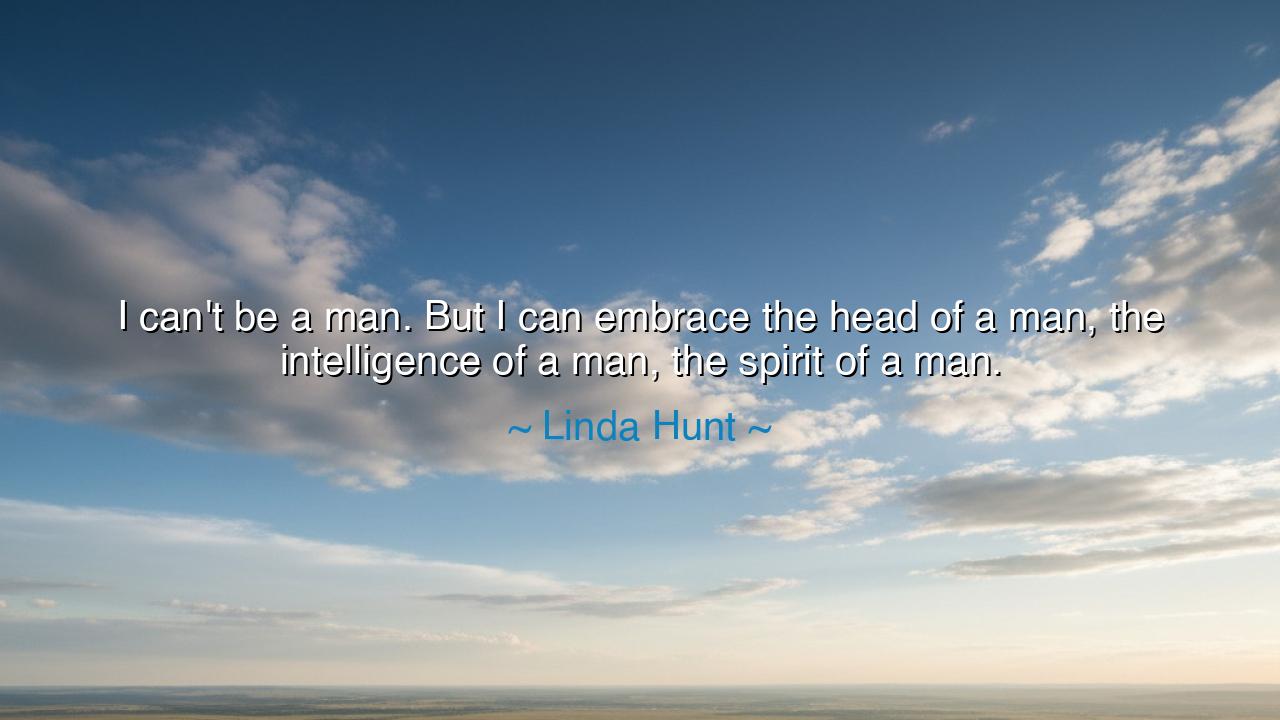
I can't be a man. But I can embrace the head of a man, the
I can't be a man. But I can embrace the head of a man, the intelligence of a man, the spirit of a man.






The words of Linda Hunt strike like a quiet thunder, carrying both humility and defiance within their echo. “I can’t be a man. But I can embrace the head of a man, the intelligence of a man, the spirit of a man.” In these words lies not the cry of imitation, but the declaration of transcendence. She does not seek to become another, but to absorb the essence of strength, intellect, and courage that has too long been confined by the borders of gender. This is not the longing of one who feels lacking, but the awakening of one who understands that greatness has no single form—that wisdom, intelligence, and spirit flow beyond the vessel of flesh.
In ancient times, philosophers spoke of the divine duality that resides in all beings—the balance of masculine and feminine forces, of reason and intuition, of steel and flame. The ancients called this balance androgyny of the soul, a state of completeness that transcends division. What Hunt expresses is this very truth: that the human spirit, when fully awakened, embraces both the mind of clarity and the heart of compassion, the strength of the warrior and the wisdom of the mother. She teaches us that one need not wear the form of another to wield their power; one need only reach inward and claim the shared essence of humanity.
Her words were born of experience, not mere philosophy. For in her celebrated performance as Billy Kwan in The Year of Living Dangerously, Linda Hunt—though a woman of small stature and quiet voice—embodied a man of immense moral strength and vision. Through her artistry, she stepped beyond identity into pure spirit. The audience did not see a woman pretending to be a man; they saw a human being radiating truth. For this, she was honored, and more importantly, she became a living symbol of what it means to transcend limitation. Hers was not an act of disguise, but of revelation: that within each soul lies the capacity to embody greatness in any form.
Consider also the story of Joan of Arc, the maiden who heard divine voices and took up the armor of men to lead armies and defy kings. She, too, could not become a man in body, but she embraced the courage, strategy, and sacred fire that the world had once declared as masculine. Through her faith and her fearlessness, she proved that valor is not bound to gender, nor to birth, nor to the narrow definitions of society. Like Hunt, she reached into the deep well of the universal spirit, where all qualities—strength, compassion, intellect, and vision—reside as one.
This truth burns through the centuries: that every soul carries within it the full spectrum of human potential. When Hunt speaks of embracing the head, the intelligence, and the spirit of a man, she speaks to something greater than gender—she speaks of integration, of drawing wisdom from every aspect of existence. To “embrace” is to learn, to absorb, to honor. And in doing so, she reminds us that to become whole, we must welcome all that life has to offer, even those qualities the world tells us do not belong to us.
But this teaching is not for artists alone—it is for all who seek to live deeply. Too many people, trapped by custom or fear, deny parts of themselves. The gentle man is told to harden his heart; the strong woman is told to soften her will. Yet life demands balance, not conformity. Each of us must learn to blend intellect with empathy, logic with love, will with wisdom. Only then do we approach the full measure of what it means to be human.
Therefore, remember this, you who walk the path of self-knowledge: You are not confined by what the world names you. You may not be able to become another—but you can embody their virtues, their strengths, their essence. Learn from all who walk this earth, whether king or servant, man or woman, elder or child. Seek the qualities that ennoble the soul, and weave them into your being. For the spirit that embraces all forms becomes vast as the sky, free from boundaries, radiant with the wisdom of the ages.
And in that freedom, as Linda Hunt discovered, you no longer ask, “What can I be?” Instead, you stand tall and say, “I can embrace all that makes humanity divine.”






AAdministratorAdministrator
Welcome, honored guests. Please leave a comment, we will respond soon